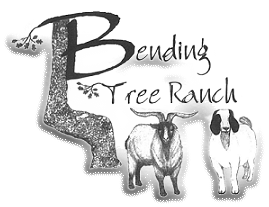
All images/artwork on this website are the property of Bending Tree Ranch and may not be reproduced without written permission.
Copyright © 2001-2018 All Rights Reserved

All images/artwork on this
website are the property of Bending Tree Ranch and may not be reproduced without
written permission.
Copyright © 2001-2018
All Rights Reserved
What exactly *is* a Myotonic goat?
What about Stifflegs, Nervous Goats, Wooden legged and Fainters...........are they all the same? In a nutshell the answer should be "YES". All these goats have in common the same condition Myotonia Congenita. Myotonic Congenita is the medical term to describe stiffening. Myotonia is a inherited neuro-muscular condition which causes the goats muscling to stiffen or "lock-up" when they are startled or overly excited . If they are off balance when their muscles lock up they will tip over, thus the terms of Nervous Goats, Fainters, or Stifflegs. These goats will still be chewing their feed/hay should they get startled and loose balance. Myotonia occurs in the muscle fiber... not as a function of the central nervous system.... and causes no problem for the goats. The goats stay conscious the whole time......thus the term "fainter" is a misnomer. The proper name for these animals is "Myotonic".
|
|
|
|
The contraction and relaxation of these muscles results in very tender meat. These goats carry more muscle in relationship to their gross weight. Research done at Virginia State University reveals a meat-to-bone ratio of 4:1, significantly higher than other breeds. Dr. Lou Nuti of Prairie View A&M University's International Goat Research Center north of Houston, Texas, has completed research proving a 6% to 10% greater meat yield is achieved by using a Myotonic buck on other-breed does. This means less waste and more money in the producer's pocket.
|
|
Myotonic goats are a landrace breed with the first documentation of them here in the US occurring around the 1870's where a transient farm worker named John Tinsley showed up in Marshall County, Tennessee at the farm of Dr. H. H. Mayberry. No one knows where he came from; he had a strange accent and wore a cap similar to either a fez or beret. He was thought to have come from Nova Scotia and he brought along with him three or four does and a buck of a "unique" strain. Tinsley was a quiet, private person and never shared his origins or where he came into ownership of his animals. He suddenly left one day after selling the animals to Dr. Mayberry. This is the best documentation of the origin of the breed.
Self-sufficient, sure-footed and adaptable, these
animals are excellent goats to raise. They are not fence jumpers or
climbers. They are a very docile breed, curious and friendly.
|
|
Does are excellent mothers, very protective of their babies, maternal, and easy kidders. Myotonic does normally have multiple births, and a 200% kidding ratio is not uncommon. Well-attached compact udders produce milk "on demand." Research completed at Virginia State and Virginia Tech universities has revealed these durable, self-sufficient pasture animals to be more parasite resistant than other breeds. Myotonics tend to be "year-round" (aseasonal) breeders.
|
|
Different breeders breed their lines for specific traits......some for longer hair, some for smaller or larger size, better muscling, blue eyes, etc. Our focus at Bending Tree Ranch is for a better muscled goat, without introducing another "breed" of goat into the lines. All of our Myotonics and Tennessee Meat Goats™ (TMG™), the trademarked name of Onion Creek Ranch's larger, heavier muscled Myotonics, were developed by breeding many generations of heavier muscled Myotonic bucks to other heavier muscled Myotonic does without the influence "other breed" genetics to reach our goals.
|
We are thrilled to
have completed our first export into Bending Tree Ranch influence is improving genetics worldwide
|
We are members of the following registries:
International Fainting Goat Assn
Come on in and visit a while and check out some of our
breeding stock and kids.
Visits in person to BTR are welcome too.
Just
drop us a line or give us a phone call to set up a convenient time.
![]()
Bending Tree Ranch
Damascus, AR
Phone: 501-679-4936
BendingTreeRanch@cyberback.com